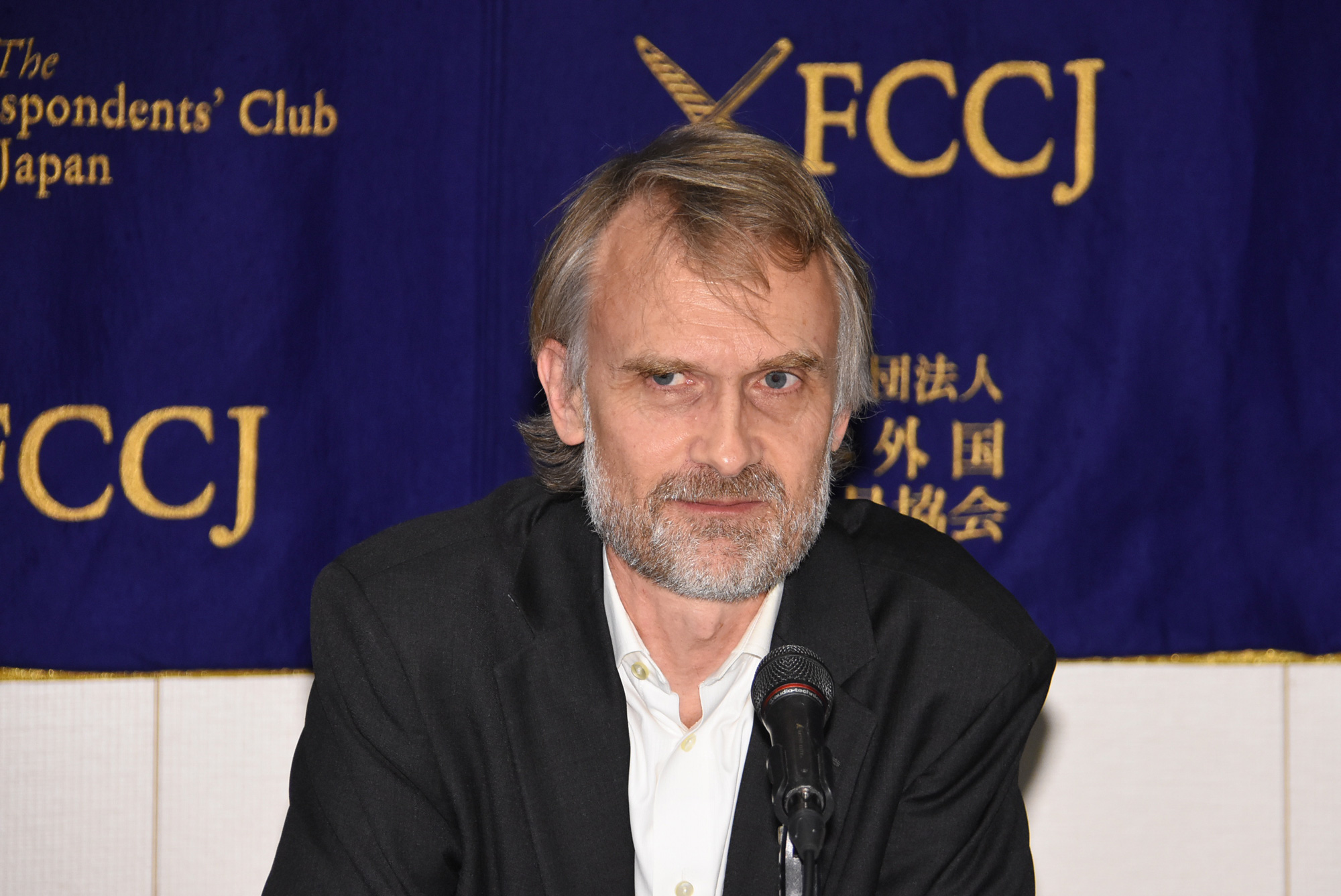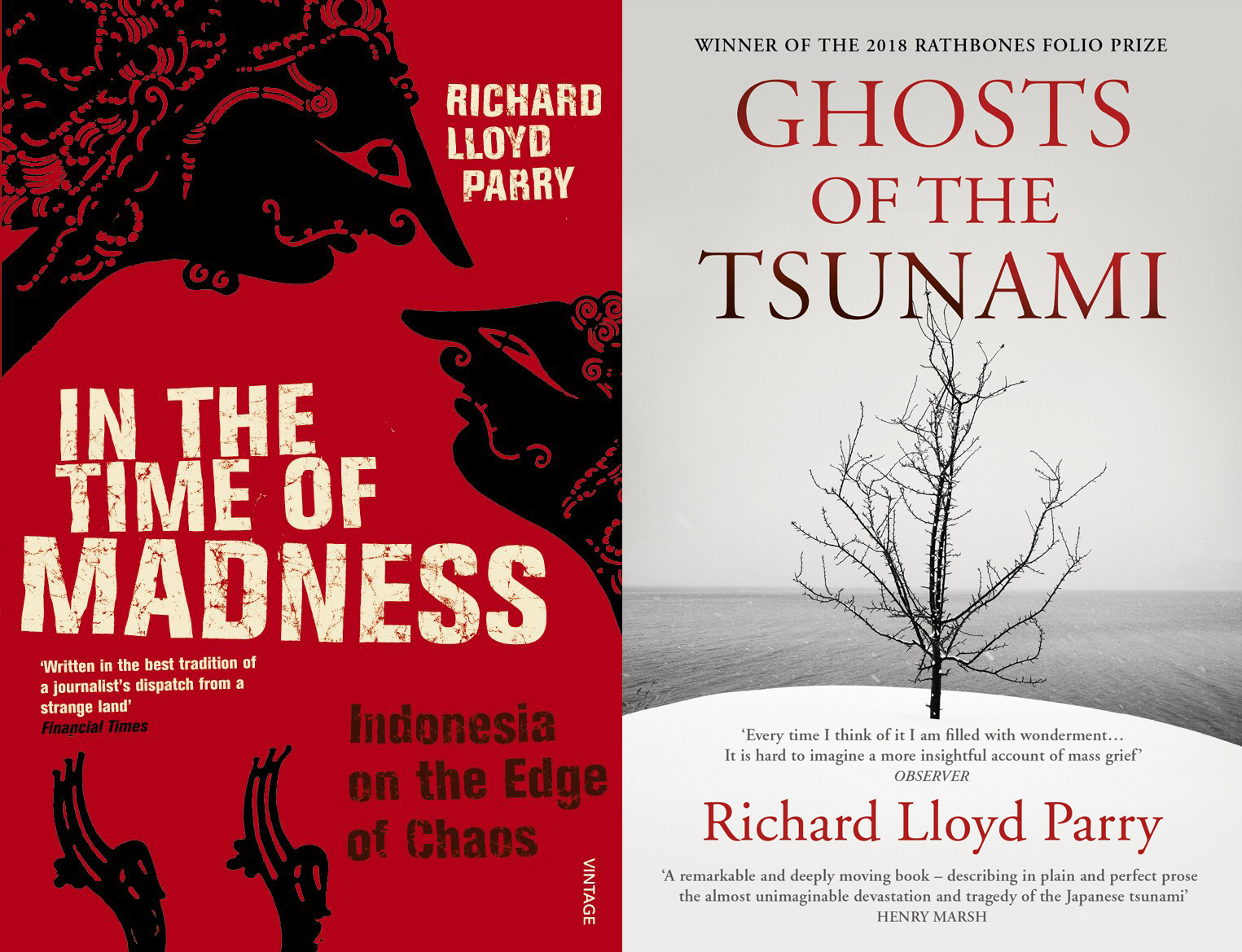Issue:
January 2022
Richard Lloyd Parry, Asia editor of The Times, tells FCCJ members why he became a journalist

Richard Lloyd Parry, the Asia Editor and Tokyo Bureau Chief of The Times of London, was chosen for the inaugural “Behind the Story – What have Foreign Correspondents seen and thought in Japan?” event on December 15 at the FCCJ. The series is being promoted by the Marketing and Membership Committee to give an insight into how foreign correspondents work in Japan and the region, and to learn what they have experienced.
Lloyd Parry has experienced plenty, from the cannibals of Borneo to the destruction of the March 2011 tsunami. He was given a clue as to what to expect in his new job two days before his initial journey to Japan in 1995, when the Aum Shinrikyo cultists unleashed their murderous sarin attack on the Tokyo subway. Japan was still recovering from the shock of the Great Hanshin Earthquake in January that year, and the two events were reminders of the destructive power of both nature and humans. Add to that the 50th anniversary of the end of the Pacific War and the start of Japan’s economic downward spiral, and it is no surprise that Lloyd Parry recalled: “It was a very bad time for Japan, but for a foreign correspondent it was actually a very good time in the rather vampiric way we have of preying on disaster, and it was a chance for me to learn the job.”
As a reporter for a traditional newspaper, Lloyd Parry still believes in the value of good journalism and the importance of true reporting – values that earned him the Foreign Correspondent of the Year in the 2005 "What the Papers Say” Awards.
“People sometimes ask, why journalism? Why did you choose that? And we're supposed to give answers like ‘We want to make a difference’ and ‘We want to change the world,’” Lloyd parry told his audience.
“The reason for becoming a journalist is because it's interesting and real journalism does have the power to do good in the world. It is an important component of liberal democracies and the job of journalism should be taken very seriously indeed, and journalists bear responsibility. I think that for an individual journalist to take himself too seriously is a mistake and it doesn't make for good work. The best journalism is rooted in fact, in the concrete, real world around us, in the details of everyday lives, and its purpose is to inform and to educate, but also to entertain.”

Lloyd Parry has written three critically acclaimed books: In The Time of Madness about conflict in Indonesia; People Who Eat Darkness on the death of Lucie Blackman; and Ghosts of the Tsunami about the aftermath of the triple disaster in Tohoku. All three look into the deepest – and sometimes darkest - recesses of the human soul.
“It’s frustrating that some stories can't be properly told in the form of short newspaper articles or a short TV film,” he said. “That's a frustration we all share. You spend a long time working on the story and you have so much information but no way to express it all, and that's why I write books.”
In The Time of Madness and Ghosts of the Tsunami were on-the-spot accounts of human tragedy, but the story of Blackman evolves physically with the discovery of her dismembered body in a cave, and then emotionally as the Blackman family disintegrates in the hopeless search for their daughter and sister. “What began as a mystery became a tragedy and a detective story,” Lloyd Parry said.
But the nitty gritty of daily journalism is what fires him up most. “Writing and doing books or longform articles doesn't pay the bills,” he said. “I think I would miss journalism if I was to retire and become a sage and just write books.”
He still believes in the job of the journalist and the mainstream media, and while he accepts the reality of social media, he doesn’t recognize it as journalism and points out that the anticipated “revolution” in citizen journalism never really got off the ground.
“I think the authority of the media is being challenged and undermined partly by online forms of social media but I don't know how bad it really is,” he said.
He pointed out that many stories doing the rounds of social media actually originate in the mainstream media: “You need people who are paid full-time to report and think about reporting, and to edit those reports and frame them and package them in different ways, and there's no sign of those jobs disappearing even though their form and configurations are changing.”
Fred Varcoe is a British freelance journalist. He was formerly sports editor of The Japan Times and Metropolis magazine, and has written on sports, music, cars and other topics for The Daily Telegraph, the Daily Mail, Billboard, Automobile Year, Reuters, the Japan Football Association, the International Volleyball Association and various websites.

